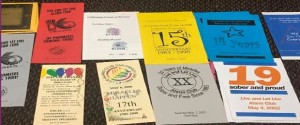 It’s Saturday night and Tondelay O., a 6-foot drag queen is dressed to the nines. But Tondelay’s not dressed for a performance, and she’s not going to a party.
It’s Saturday night and Tondelay O., a 6-foot drag queen is dressed to the nines. But Tondelay’s not dressed for a performance, and she’s not going to a party.
Tondelay and a half-dozen or so of her “sisters” mingling in the crowd of about sixty-five are attending a meeting of Alcoholics Anonymous at the Live and Let Live Alano Club (LLLAC).
LLLAC sees approximately 1,000 people cross its threshold every week, during which time it hosts over 40 meetings – a great many of which are attended by LGBT community members like Tondelay, who find LLLAC a welcome and safe place to become free of their addictions from alcohol, narcotics, gambling, sex and other substances or addictive issues at LLLAC.
But that hasn’t always been the case. “It was not uncommon for me to sit in a straight AA meeting and hear ‘fag’ being referenced to me by the other members,” says Arlene J., a charter member of LLLAC. “I would get up, leave that meeting, go to another one, and the same thing would happen there! At least I could go to the gay meetings [at LLLAC] and not worry about that.”
If you ask any of the LGBT “old timers” (as long-term recovering alcoholics and addicts are affectionately dubbed in 12-step communities) how it was when they got sober, you’ll hear the same story. Because in the 1930s, when AA was born, 12-step communities considered being gay a “character defect” – an attitude that remained unchanged until the early ‘70s. As a result, countless GLBT alcoholics and addicts perished.
With the 32nd anniversary of the Live and Let Live Alano Club pending, preparations are under way to celebrate its past, and reveal its future goals. LLLAC will once again hold its Anniversary Celebration Sunday, May 31, in its facilities at 1730 Monroe Avenue in University Heights, recognizing the LGBT recovering community’s rejection, struggles, and inevitable acceptance.
And so it began. Shortly afterwards, small bands of gay and lesbian meetings started popping up around the city.
Stepping Stone opened its door for sober residential living and began hosting a men’s meeting called “At Home Men’s” which is now the oldest gay men’s meeting in the state.
Lesbians started Sober Sisters, a women’s meeting designed to help lesbians with recovery issues, is now the longest-running meeting for lesbians in San Diego.
As meetings began to grow, the members realized that they needed a community meeting place where both men and women could attend. As a result, the “2 Bit Speaker Meeting” was formed for all groups to attend every Saturday night where two gay or lesbian speakers tell their stories about their alcoholism, addiction, or often both.
Tonight, as Tondelay O. tells her story at 2 Bit, she is in good company. There are literally thousands of LGBT people who have found a new way to live happy, healthy, productive lives through the recovery services available at LLLAC.
John C. (one of the first Board of Directors members) summarizes the process well, “As one of LLLAC’s founders, I can hardly be negative about it, but there is nothing to be negative to say. When first we opened on Fourth Avenue, it became a haven. If you were struggling to remain sober, it wasn’t necessary to hide in bed or sit on your hands; you had a place to go. And when you got there, other sober LGBT people would be willing to talk, listen, even ignore you – if that was what you wanted, or ask you to get involved in projects.
“I’m amazed that it has lasted for 32 years! We did it on a ‘wing and a prayer’ and never, in the time of my close involvement, had any certainty of financial security. Perhaps the most meaningful thing you can say about LLLAC and sober gay community of San Diego is that it has endured and even flourished. If it and the people it serves had no meaning, no place in the context that is San Diego, then we and it would be gone.”
With nothing more than sheer determination and need, these pioneers, a small group of a dozen or so men and one woman, bravely stood up and risked criticism, ridicule and discrimination to meet the dire need of the LGBT community’s substance abuse problems.
They helped bring meaning and dignity to the countless LGBT men and women who lost their lives to rampant alcoholism and drug addiction because they were not accepted for whom and what they were.
Most importantly, the Live and Let Live Alano Club continues to bring hope and encouragement to the many afflicted souls who turn to the LGBT recovery community for help.
The Live and Let Live Alano Club (LLLAC) has been a San Diego institution for over 31 years providing services to the LGBT community. The LLLAC is one of the oldest organizations, continuously serving LGBT nonprofits in San Diego and has positively impacted tens of thousands of lives. lllac.org











